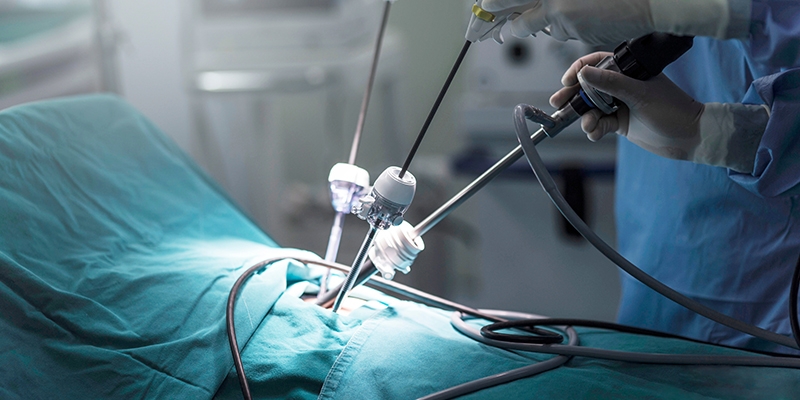Laparoscopy, often referred to as minimally invasive surgery, is a modern surgical technique that allows doctors to diagnose and treat various conditions with minimal trauma to the body. This guide aims to walk you through what to expect during a laparoscopy procedure, ensuring you feel informed and prepared.
Understanding Laparoscopy
Laparoscopy involves the use of a laparoscope—a thin, flexible tube equipped with a camera and light. The camera projects images of the internal organs onto a monitor, enabling the surgeon to perform procedures with precision through small incisions, typically around 0.5–1 cm.
Common reasons for a laparoscopy include diagnosing abdominal pain, treating endometriosis, removing gallstones, or performing a hysterectomy. It is widely favored for its shorter recovery time, reduced risk of infection, and minimal scarring compared to open surgery.
If you are looking for expert care in laparoscopic procedures, Manav Hospital, recognized as the Best Urology Hospital in Jaipur, offers state-of-the-art facilities and a team of highly skilled surgeons. Whether addressing urological concerns or other surgical needs, our hospital is committed to providing precision treatment and excellent patient care.
Preparing for Laparoscopy
1. Pre-Operative Consultation
Before the procedure, your doctor will:
- Review your medical history.
- Discuss the reason for the laparoscopy.
- Explain the risks and benefits.
- Answer any questions or concerns.
2. Pre-Procedure Instructions
You may be advised to:
- Avoid eating or drinking for 8–12 hours before the surgery.
- Stop taking certain medications, such as blood thinners or non-steroidal anti-inflammatory drugs (NSAIDs), as instructed.
- Arrange for someone to drive you home post-surgery since general anesthesia can impair your ability to operate a vehicle.
Step-by-Step Guide to the Laparoscopy Procedure
1. Arrival and Preparation
- Check-In: Upon arrival at Manav Hospital, you will check in and complete any necessary paperwork.
- Pre-Operative Prep: A nurse will guide you to a pre-operative area where:
- You will change into a hospital gown.
- Your vital signs (blood pressure, pulse, temperature) will be measured.
- An intravenous (IV) line will be inserted to administer fluids and medications.
2. Anesthesia Administration
- The anesthesiologist will discuss the type of anesthesia you’ll receive. Most laparoscopies require general anesthesia, meaning you’ll be asleep throughout the procedure.
- Once the anesthesia takes effect, you’ll be moved to the operating room.
3. The Procedure
- Initial Incision: The surgeon will make a small incision near the navel to insert the laparoscope.
- Gas Inflation: Carbon dioxide gas is introduced into the abdominal cavity to create space for better visualization and maneuverability.
- Additional Incisions: Depending on the complexity of the procedure, one or two more small incisions may be made to insert surgical instruments.
- Performing the Surgery: Guided by the camera, the surgeon performs the required procedure, whether it’s removing a damaged organ, repairing tissue, or diagnosing a condition.
4. Completion
- After completing the surgery, the instruments and laparoscope are carefully removed.
- The gas is released, and the incisions are closed with sutures or surgical glue.
- Sterile dressings are applied to the incision sites.
Post-Procedure Recovery
1. Recovery Room
- You will be taken to a recovery area to wake up from anesthesia.
- Nurses will monitor your vitals and check for any immediate post-operative complications.
2. Pain Management
- It is common to experience mild discomfort or soreness at the incision sites.
- Shoulder pain may also occur due to the residual gas irritating the diaphragm. This typically resolves within a day or two.
- Pain medications and anti-nausea drugs may be provided to ensure comfort.
3. Discharge
- Most laparoscopies are outpatient procedures, meaning you can go home the same day.
- Your doctor will provide instructions on caring for the incision sites, managing pain, and recognizing signs of complications.
At-Home Recovery
1. Activity Restrictions
- Rest is essential in the first few days, but light walking is encouraged to improve circulation.
- Avoid strenuous activities, heavy lifting, or driving until cleared by your doctor.
2. Diet
- Start with light meals and gradually return to your regular diet.
- Drink plenty of fluids to stay hydrated and prevent constipation caused by pain medications.
3. Incision Care
- Keep the incision sites clean and dry.
- Follow instructions for changing dressings, if necessary.
- Avoid soaking in baths or swimming pools until the incisions are fully healed.
Potential Risks and Complications
While laparoscopy is considered safe, it’s important to be aware of potential risks:
- Infection: Signs include redness, swelling, or discharge from the incision sites.
- Bleeding: Rare but possible at the incision or surgical sites.
- Organ Injury: Although rare, nearby organs may be accidentally damaged.
- Blood Clots: Prolonged immobility can increase the risk, which is why light walking is recommended.
Contact your healthcare provider immediately if you experience severe pain, fever, or unusual symptoms.
Benefits of Laparoscopy at Manav Hospital
At Manav Hospital, patient care and advanced medical technology come together to provide exceptional outcomes. Our state-of-the-art facilities and experienced surgeons ensure:
- Accurate diagnoses and effective treatments.
- Minimal post-operative discomfort.
- Personalized care tailored to each patient’s needs.
Frequently Asked Questions (FAQs)
- How long does the procedure take?Laparoscopy typically lasts between 30 minutes and 2 hours, depending on the complexity of the procedure.
- When can I return to work?Most patients can resume light activities within a week and return to work in 1–2 weeks, depending on the nature of their job.
- Is laparoscopy painful?Discomfort is minimal compared to open surgery. Pain medications effectively manage post-operative soreness.
- Are the scars permanent?Laparoscopic incisions leave minimal scars, which fade significantly over time.
Conclusion
Laparoscopy is a revolutionary procedure offering precision, minimal discomfort, and quick recovery. By understanding what to expect before, during, and after the procedure, you can approach your surgery with confidence. At Manav Hospital, our commitment to patient safety and comfort ensures a smooth surgical experience.
Under the expert care of Dr. Sandeep Nunia, recognized as the Best Urologist in Jaipur, you can trust that your laparoscopy will be handled with utmost precision and compassion. Dr. Nunia’s extensive experience in urological and laparoscopic procedures ensures optimal outcomes and personalized care.
If you have any questions or are considering a laparoscopy, contact Manav Hospital to schedule a consultation with Dr. Sandeep Nunia and our expert team today.




